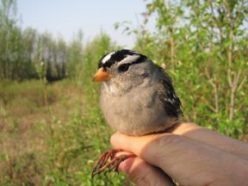Sleep lessons from sparrows
During migration season, certain sparrows remain amazingly alert even when they haven't had much sleep.
If you’ve tried studying when you’re tired, you know that it can seem impossible to get any of the information to stick.
Now, a new study of sleep in sparrows suggests that the link between sleep and the ability to learn may be more complicated than people realized. During migration season, these sparrows do well in learning tests even when they’ve had very little sleep.
 |
|
White-crowned sparrows fly mostly by night and eat by day as they migrate up to 4,300 kilometers each spring and fall.
|
| Niels C. Rattenborg, University of Wisconsin–Madison |
White-crowned sparrows migrate enormous distances. In the spring, they fly 4,300 kilometers from southern California to Alaska. In the fall, they make the trip back. The sparrows fly at night and spend their days looking for food. This means that during migration, they get about one-third as much sleep as they do at other times of the year.
Niels C. Rattenborg of the University of Wisconsin–Madison wanted to find out how the sparrows were able to deal with getting so much less sleep. Also, could the birds get by with less sleep even when they weren’t migrating?
To find out, Rattenborg and his colleagues brought eight wild birds into a lab and monitored them for 1 year. They invented a game to check how well the birds could learn. In the game, the sparrows had to peck three buttons in a certain order to get a food treat.
The scientists discovered that the birds’ ability to learn the right button sequence depended on two things: the time of year and how much sleep the birds had had.
During migration season, the sparrows were restless at night and got much less sleep than usual. Even so, they were able to figure out how to get the food treats just as quickly as if they’d had a regular night of sleep.
Outside migration season, the scientists disturbed the birds at night to make sure they got less sleep than they normally would at that time of year. They found that the sparrows had much more difficulty learning how to get the food treats than birds that had a regular night’s sleep.
The results suggest that the sparrows can get by with much less sleep during the migration season than they can at other times of the year. If scientists can find out why this is, they may be able to learn from sparrows and find ways of helping people cope with lack of sleep.
Still, until scientists fully understand the relationship between sleep and learning, it’s better to play it safe and get plenty of shut-eye when getting ready for that next exam.







